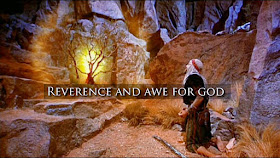What does it mean to fear the Lord? The Bible uses the word
fear at least 300 times in reference to God. But we are told God is love, so
how do we fear and love God at the same time. How do we deal with this
seemingly contradiction? While the Bible is filled with examples that fearing
the Lord is a positive, rather than a negative, thing. In Genesis 42:18, Joseph
wins his brother’s trust when he declares he is a God-fearing man. I think we
need to look at the Hebrew word for fear, yirah,
and discover what it means in the context of our relationship with God.
According to Jewish tradition, there are three levels of fear.
First, yirat ha’onesh
is the fear of unpleasant consequences or punishment. This fear is usually what
we think of when we read to fear God. It is the anticipation of pain if we do
something wring, therefore, we try to run from it. This is also the type of
fear we could have when we think of what others might think of us if we do or
don’t do an act. For example, as kids, if we think about stealing from the
store, a child might think of what his or her friends might think when they
hear he or she stole. That same child might think of what his or her parents
might think when they discover their child has stolen something. Which opinion
will win out if that child would steal and would it be enough to keep the child
from stealing? If the child anticipates pain from punishment from the parents,
he or she might think twice.
Second, yirat malkhut
is the anxiety caused by breaking God’s law. It is the fear that motivates us
to do good because we fear God’s punishment in life or in the afterlife. The
Bible tells us that God is our judge for every deed we’ve ever done. First
Corinthians 3:13 says “his work will be shown for what it is, because the Day
will bring it to light. It will be revealed with fire, and the fire will test
the quality of each man’s work.” Second Corinthians 5:10 says “For we must all
appear before the judgment seat of Christ, that each one may receive what is
due him for the things done while in the body, whether good or bad.” This is
the fear is the due to self-preservation to avoid God’s rightful wrath. This
fear is the basis of good deeds get rewarded while bad deeds get punished.
Third, yirat
ha-rommemnut is the most important and highest form of fear. It is a
profound reverence for life that comes from rightly seeing the presence of God
in all things. It is the Awe of the Exalted. We behold God’s glory and majesty
in all things and we are elevated to a level of reverent awareness and genuine
communion with God’s Holy Spirit. It is
the love of God which creates a loathing for all evil. Proverbs 8:13 says “to
fear the Lord is to hate evil; I hate pride and arrogance, evil behavior and
perverse speech.” Therefore, the more a person fears and respects God, the more
he or she will hate evil. In John 3:20-21 Jesus says “Everyone who does evil
hates the light, and will not come into the light for fear his deeds will be
exposed. But whoever lives by the truth comes into the light, so that it may be
seen plainly that what he has done has been done through God.”
You may be asking “ok, so do I fear the Lord or do I love
him?” Both. According to the Chofetz Chaim, a book of Jewish ethics by Rabbi
Yirsael Meir Kagan, the fear of God’s punishment may deter you from sin in the
short term but by itself is insufficient for a full and meaningful spiritual
life. We need to completely see God as the bringer of justice as well as the
compassionate savior. We must fear the Lord as our Judge and be in awe of him
as our redeemer. You may think it sounds like a contradiction. But think of
your parents. You may fear punishment from your parents for whatever you may
have done wrong and yet you look to them as a source of love and comfort. So
why is it wrong to see God that same way? Why does he have to be one or the
other? We need to draw close to God while regarding him with
exalted reverence.
In conclusion, we need all levels of yirah in our hearts and our lives. We all have fallen short of the
Glory of God. Our sin keeps us separate from God. However, though the sacrifice
of Jesus on the Cross, we can be reconciled with him. Through Jesus, we can
come to God as we would a loving parent, fearing the consequences of our sin
and yet feeling the love of his forgiveness. The judgment and our punishment of
our sin was made at the cross and now we can be declared righteous by faith. Therefore,
it is the combination of fear and love that leads us to the place of genuine
awe and complete communion with God.
The Awe of The Lord further thoughts on Parashat Eikev by
John J Parsons http://www.hebrew4christians.com/Scripture/Parashah/Summaries/Eikev/Yirah/yirah.html





No comments:
Post a Comment